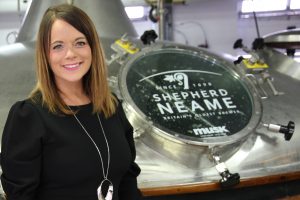by Jo Richardson, EMBA 2019
“Your energy will determine your success”.
After a 5am alarm to catch the first train into London after a particularly busy week at work for the Interpersonal Dynamics elective at LBS, I looked down at my third flat white of the day and hoped Professor Richard Jolly would build on this opener with practical advice.
I am 18 months into my Executive MBA and, having taken on a senior management role in a new company just after I started at LBS, it can at times feel like being a child at the funfair – there’s so much stimulation and so many new experiences that your senses are on high alert at all times. It’s fair to say that I’ve really had to get to know myself on a different level – to challenge myself around what I prioritise and in Richard’s words, have needed to shelve several displacement activities that were energy-depleting and left me with minimal opportunity to recharge.

It is exactly this need to build greater self-awareness to develop better relationships with others and, just as critically, with yourself that Richard aims to meet with the Interpersonal Dynamics elective. The functional skills that the MBA teaches you need to go hand in hand with an ongoing self-awareness journey that will help you set clear, realistic goals and set boundaries to protect the things that matter most – something that becomes increasingly important as you progress along the leadership journey throughout your career.
At the start of the elective, we were lucky enough to have Michael Chaskalson, renowned mindfulness coach, to guide us through short meditations that we were encouraged to practice on a daily basis to develop a greater sense of awareness and a more balanced mindset. It’s something I had dabbled in during my career break, where a backdrop of tropical Malaysian beach had been an apt partner to an appetite to focus on the present. But it was surprising how much of a guiding force this simple 10 minute practice could be in navigating through the rollercoaster ride of balancing priorities and ultimately restoring my energy levels. I’d be lying if I said I found it easy to carve out just 10 minutes every day to meditate but I knew that the times I prioritised this were the days when I was best able to bring more of my authentic self into my role.
This is one of the core messages at the heart of the elective – if you change the lens that defines your reality then you will be able to reframe the opportunity, the challenging situation, even to the degree of changing how you spend that first 10 minutes of your day. And by making different choices, you will open up a whole new set of options. As leaders, Richard Jolly stresses throughout the course that we have so many choices about the life we lead, but often we can be blind to this. The course was structured around encouraging us to be curious: to reappraise the choices we make and suggesting an alternative lens to view relationships and success through. The benefit of having a set of tools to relook at how we approach situations, an external view on how effectively we build relationships with others or just debating ideas with the other students on the course who were from over 40 different countries and multiple different industries, felt like such a luxury.
But what is success? Jolly suggests this is rooted in a deep understanding of your signature strengths, so that you can craft a career and a life where you spend time on things that you’re most passionate about. Sounds obvious. But in fact, as with much of the material on the course, it was an opportunity to really relook at what this means. We solicited feedback from 20 people – from colleagues, to friends, to peers, to family – and we asked them to each detail three stories that brought our signature strengths to life. In a world of constructive feedback, it was excruciating to ask people to only focus on our strengths but the output was fascinating. In discussion with my study group, we agreed that there were a lot of parallels between the strengths that people from different parts of our lives identified, but what really surprised us were the stories that people told. To realise the impact you’ve made on someone in a situation that you may not have been able to instantly recall was really powerful and this is where your signature strengths are most profound. As a study group, we talked about the courage that you really have to build to give yourself permission to focus on your strengths, the resilience you need to continue to build to combat adversity and the very real opportunity that starts to present itself when you’re not paralysed by failure.
Your energy is one of your biggest assets and success is when you can put your energy into something that gives you a greater sense of purpose.
So turn burning platforms into ambitions, turn the fear of a rollercoaster ride into gratitude that you’ve been given the opportunity to jump on-board. Have the courage to try things. Throughout the course I’ve definitely felt more inspired, more effective and more curious since I’ve started to reframe my lens to manage my energy, not my time. With these early starts, I haven’t quite managed to cut back on my flat whites habit just yet, but as Jolly states, leadership and self-development are both ongoing processes.
